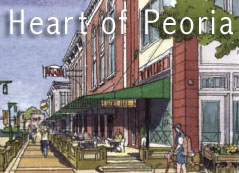 Tonight, the City Council will be discussing whether to offer a somewhat unique incentive to a local private business. Firefly Energy needs a loan, and they’ve been unable to secure it through the Small Business Administration (Caterpillar owns 35% of Firefly, hence they’re not small enough for an SBA loan) or Industrial Revenue Bonds (also ineligible).
Tonight, the City Council will be discussing whether to offer a somewhat unique incentive to a local private business. Firefly Energy needs a loan, and they’ve been unable to secure it through the Small Business Administration (Caterpillar owns 35% of Firefly, hence they’re not small enough for an SBA loan) or Industrial Revenue Bonds (also ineligible).
So the plan is for National City to provide them a loan that would be secured by their equipment and a loan guarantee from the City of Peoria and Peoria County. For the City’s part, they are wanting to pledge $3.3 million in utility tax receipts.
This is organized more or less just like a Small Business Administration (SBA) loan. The SBA doesn’t directly loan money, but rather acts as guarantor, which reduces the risk for private financing companies and allow loans to be made that otherwise would not be approved. “The policy question for Council,” the council communication states, “is whether the City of Peoria should guarantee private debt to encourage economic development. Furthermore, if this approach is used what should be the guidelines for assistance? City and County staff could develop guidelines if the Council so desired.”
I expect this to be the question that gets the most discussion. This kind of incentive has apparently not been used before by the City. If the City approves using it tonight, you can bet they’ll be asked for such assistance again. What kind of precedent, if any, does this vote set? There are two parts to any precedent that may be set: (1) The use of this incentive at all, and (2) how much money they’re willing to guarantee.
It’s common for loan guarantees to be provided at the state level, but not as common for cities. My efforts at Googling such a situation at the city level only turned up one city that provides such incentives: New Brunswick, New Jersey. They’re a city of about 49,000 residents, and their program works like this:
New Brunswick provides a 50% guaranty to loans made through the program with participating banks. The guaranty permits banks to make loans they would otherwise decline. The borrower gets access to capital at reasonable rates.The Economic Development staff will also assist business owners in developing a business plan for presenting their loan ideas to bankers or hard money lenders.
Loan Term: 1-7 years
Loan Rate: Prime + 2 points. The rate is fixed at the time of closing
Loan Amounts: $25,000 – $150,000
I called the Peoria City Manager’s office and also talked to the Economic Development department, but neither of them could provide the names of other cities that provide similar programs. I didn’t talk directly to City Manager Randy Oliver, however, so it’s certainly possible he knows of other cities.
What I found interesting was the amount of the loan they guarantee in New Brunswick — the upper limit is only $150,000. According to this website, the average loan guarantee in Michigan’s Capital Access Program is $53,000. California’s Small Business Loan Guarantee Program “cover[s] up to 90% of the loan amount, with the guaranteed portion of the loan not exceeding $500,000.” Here in Peoria, we’re talking about $3.3 million — and that’s only the City’s share. The County is putting up an equal amount for a total guarantee of $6.6 million!
I’d like to see Firefly Energy stay in Peoria, and I’m not against providing them incentives, but this seems to be a rather large loan guarantee when compared to other state and local programs I could find. Considering the County won’t take up this issue until June, I would suggest the City not vote on it tonight. Discuss it, think it over, consider the ramifications, take up the staff’s offer to write up guidelines — this is too big to rush into.
 The Peoria City Council has a library liaison. It used to be John Morris, but since he’s left the council, there’s a new liaison: Gary Sandberg. An inspired choice, if you ask me, considering they’re planning to spend a whole bunch of taxpayer money on capital improvements.
The Peoria City Council has a library liaison. It used to be John Morris, but since he’s left the council, there’s a new liaison: Gary Sandberg. An inspired choice, if you ask me, considering they’re planning to spend a whole bunch of taxpayer money on capital improvements.
 The City Council tonight deferred action on the fate of the Heart of Peoria Commission (HOPC) until July 24. There was a meeting tonight at 4:30 that included Councilwoman Barbara Van Auken (2nd Dist.), HOPC Chairman Bill Washkuhn, Councilman Patrick Nichting (5th Dist.), and Mayor Jim Ardis. Although an effort was made to resolve the issue in time for tonight’s meeting, they did not reach a consensus, hence the item was deferred.
The City Council tonight deferred action on the fate of the Heart of Peoria Commission (HOPC) until July 24. There was a meeting tonight at 4:30 that included Councilwoman Barbara Van Auken (2nd Dist.), HOPC Chairman Bill Washkuhn, Councilman Patrick Nichting (5th Dist.), and Mayor Jim Ardis. Although an effort was made to resolve the issue in time for tonight’s meeting, they did not reach a consensus, hence the item was deferred. My sources tell me that a compromise is in the works for Fire Station 11. You may remember that a previous council cut an engine company from the station as a cost-savings move three years ago. Ever since then, every election has included the question of how/when the council will fully staff Fire Station 11.
My sources tell me that a compromise is in the works for Fire Station 11. You may remember that a previous council cut an engine company from the station as a cost-savings move three years ago. Ever since then, every election has included the question of how/when the council will fully staff Fire Station 11.  Another big change that’s on the council agenda for Tuesday night is an amendment that would allow council members to
Another big change that’s on the council agenda for Tuesday night is an amendment that would allow council members to 